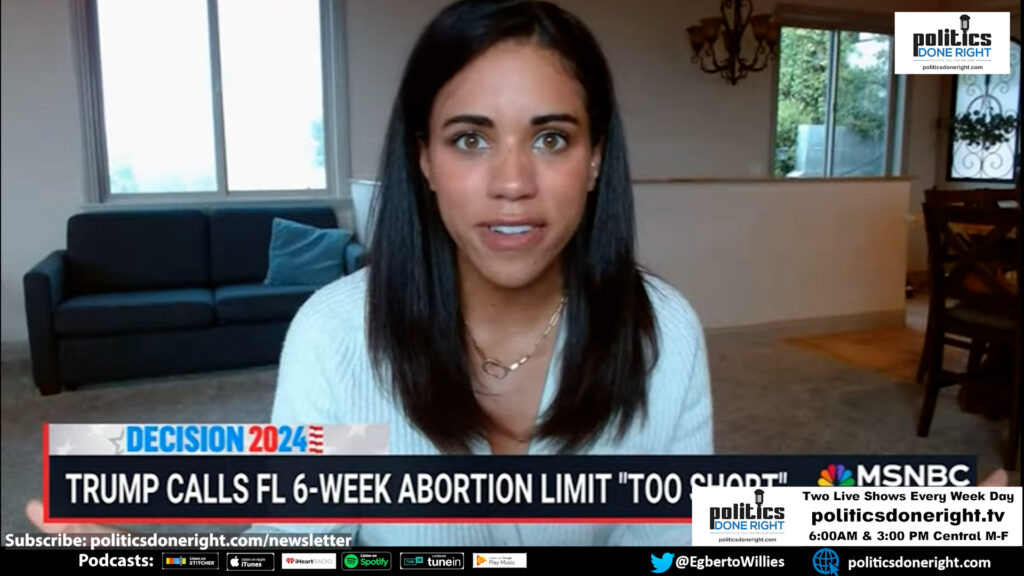As his poll numbers tank, Donald Trump’s IVF flip flop is just an election gimmick that MSNBC’s Alexi McCammond calls out in no uncertain terms.
Alexi McCammond on Trump’s IVF flip-flop
Podcasts (Video — Audio)
In a recent commentary on MSNBC, Alexi McCammond delivered a scathing critique of former President Donald Trump’s shifting stance on reproductive rights, particularly his sudden professed support for in vitro fertilization (IVF). McCammond’s incisive analysis highlights a broader issue of political opportunism and the dangerous implications of disregarding consistency in policy positions. Her commentary is a vital reminder of why voters must remain vigilant and skeptical of political figures who display such stark reversals in their stances, especially on issues as crucial as reproductive rights.
McCammond’s remarks center on Trump’s recent claims that he will protect and support IVF treatments, asserting that his newfound position is merely a political ploy. This assertion reflects a broader critique of Trump’s approach to governance, which frequently involves adopting and discarding positions based on their perceived political expedience rather than any core principle or ethical conviction.
Historically, Trump’s policies and rhetoric have often mirrored the shifting sands of political strategy rather than a coherent ideological framework. His administration’s record on reproductive rights, including attempts to dismantle the Affordable Care Act and restrict access to contraceptives, underscores a pattern of prioritizing political gains over consistent policy commitments. The former president’s recent statements about supporting IVF come in the wake of increasing scrutiny and pressure from various voter demographics, particularly women who are crucial to his electoral strategy.
The issue of IVF is emblematic of broader debates around reproductive rights, which have been increasingly polarized. McCammond’s criticism is grounded in the observation that Trump’s current stance contradicts his past policies and the prevailing views within his party. Under Trump’s influence, the Republican Party has embraced more conservative and restrictive positions on reproductive health, making his recent promises appear insincere.
For example, during Trump’s presidency, the administration supported numerous initiatives that sought to limit reproductive freedoms. The administration’s push to defund Planned Parenthood and roll back protections for women seeking reproductive care was a clear indication of its stance. Trump’s recent remarks suggesting he will support IVF, a procedure that some conservative factions have criticized, highlight a striking inconsistency. This inconsistency is not just a minor detail but reflects a broader pattern of opportunistic policymaking that prioritizes short-term political advantages over long-term, principled leadership.
McCammond’s commentary also emphasizes the problematic nature of Trump’s policy reversals. By portraying these shifts as mere political maneuvers, McCammond underscores the broader issue of accountability in political discourse. When a leader’s positions fluctuate based on immediate political pressures rather than a commitment to certain values or principles, it undermines public trust in the political system. This phenomenon contributes to voter cynicism and disengagement as citizens struggle to discern genuine policy commitments from tactical rhetoric.
Furthermore, McCammond’s critique points to a significant challenge for media and political analysts: the need for rigorous, principled journalism that resists being swayed by superficial policy changes. In an era where political discourse often descends into sensationalism and partisan bickering, McCammond’s approach stands out for its commitment to substantive analysis. By focusing on the consistency of political positions and their alignment with past actions, journalists like McCammond play a crucial role in holding public figures accountable.
The Center for Reproductive Rights provides comprehensive resources on the historical and current state of reproductive rights in the U.S. for a more in-depth analysis of the implications of Trump’s policy shifts. Their work illustrates how policy changes impact real lives and underscores the importance of stable, principled advocacy in the realm of reproductive health.
Alexi McCammond’s critique of Donald Trump’s latest statements on IVF is a powerful reminder of the importance of skepticism in political discourse. As Trump attempts to reposition himself on reproductive rights, McCammond’s analysis exposes the underlying opportunism. It highlights the need for voters to evaluate the sincerity and consistency of political figures critically. This approach helps understand the true nature of political commitments and fosters a more informed and engaged electorate.

